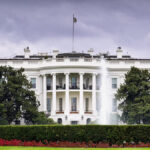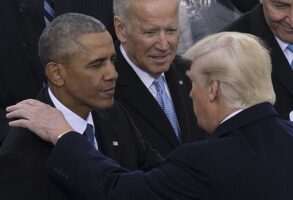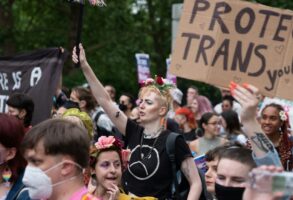
Published September 21, 2021
(This post originally appeared in Aaron Kheriaty’s Substack newsletter “Human Flourishing.” Read other issues and subscribe to the newsletter here.)
As many readers of this newsletter are aware, I recently filed a suit in Federal court against the University of California, my employer, challenging the constitutionality of the institution’s vaccine mandate on behalf of Covid-recovered individuals. Natural immunity following Covid infection is equal to (indeed, superior to) vaccine-mediated immunity. Thus, forcing those with natural immunity to be vaccinated introduces unnecessary risks without commensurate benefits—either to individuals or to the population as a whole—and violates their equal protection rights guaranteed under the Constitution’s 14th Amendment. Expert witness declarations in support of our case include, among others, a declaration from distinguished UC School of Medicine faculty members from infectious disease, microbiology/immunology, cardiology, endocrinology, pediatrics, OB/Gyn, and psychiatry.
I may seem an unlikely candidate to challenge the prevailing vaccination policies. I spent the first several months of the pandemic knee-deep in worst-case scenario planning, co-authoring the UC’s pandemic ventilator triage guidelines for the UC Office of the President, and consulting for the California Department of Public Health on the State’s triage plan for allocating scarce medical resources. As a medical educator, I encouraged medical students early on to join the pandemic mitigation efforts. In the first weeks of the pandemic when PPE was scarce, I sourced 600 N-95s from local construction companies and donated them to my hospital.
As chair of the hospital ethics committee, I have had more anguishing conversations than I can count with families to tell them their loved one is irretrievably dying of Covid. As a psychiatric consultant on the medical wards and in the emergency department, I have suited up in PPE to see hundreds of hospitalized Covid patients, witnessing the worst that this illness can do. Nobody needs to explain to me how bad Covid can be for individuals, like the elderly with co-occurring medical conditions, who are at risk of bad outcomes with the virus.
I contracted the virus last year, and despite my efforts to self-isolate, passed it onto my wife and five children. Living and breathing Covid for a year, I eagerly awaited a safe and effective vaccine for those that were still not immune to this virus to help us fight the pandemic. I happily serve on the Orange County Covid Vaccine Task Force where I have advocated that the elderly and sick be prioritized for vaccination, and that the poor, disabled, and underserved be given ready access to vaccines.
But as our pandemic response unfolded, I became increasingly concerned about ongoing developments in medicine and public health, most especially about one-size-fits-all coercive policies that override informed consent and fail to take account of individualized risks and benefits. Principles central to public health, like risk stratification and the health of the population as a whole, have been routinely ignored. Principles central to medical ethics, like transparency and adequately informed consent, have been abandoned.
Inconvenient scientific findings are now routinely ignored, reasonable questions are forbidden, and many scientists and physicians feel intimidated into silence. As I have elsewhere argued, medical exemptions for most vaccine mandates are too narrowly tailored, constraining physicians’ discretionary judgment and impairing individualized patient care. Heavy-handed mandates stigmatize and punish those who refuse to comply. Many aspects of our response to Covid no longer make sense.
As it became clear that Covid vaccine efficacy was waning with time and with new variants, and that safety signals and adverse vaccine reactions, especially in the young, were downplayed by the public health establishment, public and private institutions nevertheless ramped up their efforts to coercively mandate universal vaccination. Officials elided the huge gulf between the following claims: (1) that one can make a plausible public health argument that everyone should be vaccinated, and (2) therefore we can and should coerce everyone into getting the vaccine. The second claim in no way follows necessarily from the first.
Among the most glaring failures of our response to Covid is the refusal to acknowledge natural immunity of Covid recovered patients in our mitigation strategies, herd immunity estimates, and vaccine rollout plans. The CDC estimated that as of May 2021, more than 120 million Americans (36%) had been infected with Covid. With the more recent Delta variant wave, many epidemiologists estimate number is now closer to half of all Americans. The good news is that these Americans have immunity that is more durable and longer lasting than the vaccinated.
Among the many findings establishing this fact (and described in detail in our legal documents), one recent study directly compared natural immunity to those fully vaccinated with the Pfizer shot in a large population-based sample: fully vaccinated individuals were 6 to 13 times more likely to get infected than previously infected unvaccinated individuals; the risk of developing symptomatic Covid was 27 times higher among the vaccinated compared to previously infected, and the risk of hospitalization was 8 times higher. These findings are not surprising, since infection with the virus allows our body to form an immune response to many antigens (parts) on the virus, whereas the vaccines expose us only to one antigen, the spike protein. Furthermore, there is now considerable evidence that Covid recovered individuals may be at higher risk of vaccine adverse effects compared to those not previously infected (as seen in studies here, here, and here, among others).
I have spoken to many students, faculty, residents, staff, and patients who are aware of these basic immunological facts are asking legitimate questions about vaccine mandates. Many correctly see no medical or public health justification for subjecting themselves to the risks of the novel vaccines when they already have superior immunity. But they feel intimidated, disempowered, and vulnerable in the face of immense pressure to go along: even many physicians and nurses are afraid to speak out in the current climate of intimidation and coercion.
In my position, I came to see the importance of representing those whose voices were silenced, and to insist upon the right of informed consent and informed refusal. I have nothing personal to gain by this lawsuit and a lot to lose professionally. In the end, my decision to challenge these mandates came down to this question: How can I continue to call myself a medical ethicist if I fail to do what I am convinced is morally right under pressure?
Aaron Kheriaty is a fellow at the Ethics and Public Policy Center, where he directs EPPC’s program in Bioethics and American Democracy.
Aaron Kheriaty, MD, is a Fellow & Director of the Program in Bioethics and American Democracy at the Ethics and Public Policy Center. He is a physician specializing in psychiatry and author of three books, including most recently, The New Abnormal: The Rise of the Biomedical Security State (2022).









